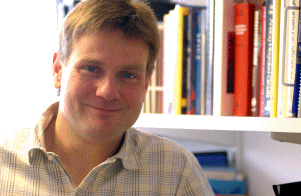Dr. Michael Kraft
The NewScientist article Silicon “Lego bricks” used to build 3D chips said
“Silicon wafers covered with matching patterns of Lego-like teeth and holes could aid the development of 3D electronics, say UK researchers.The vast majority of modern electronics are etched onto flat silicon wafers and increasing their speed normally involves squeezing more components onto the same surface area.
Now researchers are trying a different approach, by building electronics in three dimensions, typically by layering individual silicon wafers on top of one another.
Michael Kraft, Mark Spearing and Liudi Jiang at the University of Southampton, UK, have developed wafers fitted with matching sets of pegs and holes, resembling those found on Lego bricks. Tests suggest that this could provide a better construction method as microscopic features are more accurately lined up.”
Michael Kraft, Ph.D. is Senior Lecturer in MEMS at Southampton University in the School of Electronics and Computer Science department where he is part of the Nanoscale System Integration Group. His research interests include Micro-Electro-Mechanical-Systems (MEMS) / Microsystems MST, Inertial Sensors (Accelerometers and Gyroscopes), Microfabrication, Closed Loop Control System for Microsensors, Modelling and Simulation of Microsystems, MEMS for Quantum Electronics, Sigma-delta Modulators, and Circuit Design and Simulation.
Michael coauthored MEMS Mechanical Sensors, Smart Mems And Sensor Systems, Force feedback linearization for higher-order electromechanical sigma-delta modulators, Pyramidal micro-mirrors for microsystems and atom chips, Microfabricated open optical cavity with small volume and high finesse, A high performance accelerometer with fifth order sigma delta modulator, Modelling squeeze film effects in a MEMS accelerometer with levitated proof mass, and Ultra low silicon substrate noise crosstalk using metal Faraday cages in a silicon-on-insulator technology. Read his full list of publications!
Michael earned a Ph.D. in “Development of a Digital Micromachined Accelerometer Employing Oversampling Conversion” at Coventry University, UK in 1997. He earned his first degree in “Design of an Opto-Electronical Transmission Line” at Friedrich-Alexander Universität Erlangen-Nürnberg, Germany in 1993. His mother tongue is German, he is fluent in English, and has a basic understanding of French. Read his LinkedIn profile.
